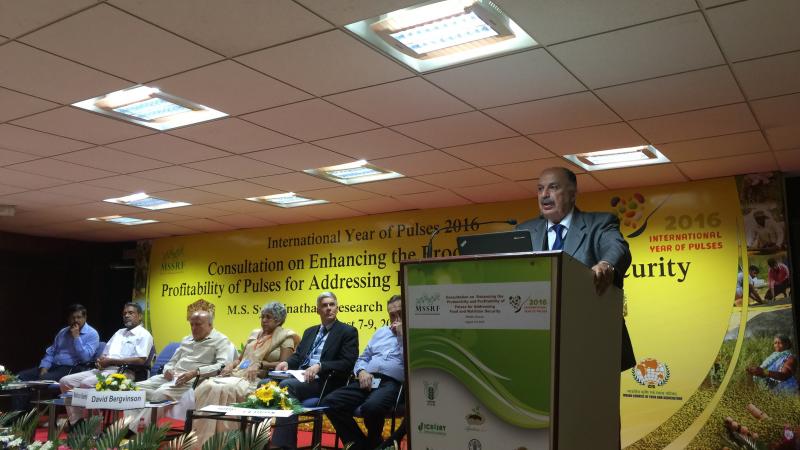ICARDA DG joins Swaminathan Foundation’s National Consultation on Pulses
Published Date
October 13, 2016

Dr. Mahmoud Solh, Director General of ICARDA, speaking at India's National Consultation Meeting on Pulses
A Consultation Meeting on “Enhancing the Productivity and Profitability of Pulses for Addressing Food and Nutritional Security” was convened by the MS Swaminathan Research Foundation (MSSRF) on the occasion of its Foundation Day, to tackle the challenge of lagging pulses production. Dr. Mahmoud Solh, Director General, ICARDA and Dr. Ashutosh Sarker, ICARDA’s South Asia Regional Program Coordinator joined distinguished national and international scientists in contributing insights to the event, along with FAO, ICRISAT, the Indian Council of Agricultural Research, and other national organizations.
The three-day event, held 7-9 August in Chennai, India, marked the UN’s 2016 International Year of Pulses and gathered all stakeholders of pulses production, including a large number of farmers.
Dr. Solh presented on “Importance, Challenges and Potential of Pulses in Dry Areas” covering the impact of ICARDA’s collaborative research on pulse improvement and its importance in human nutrition, agricultural sustainability and mitigation of climate change. Sharing ICARDA’s experiences on increasing pulses production in India, Dr. Solh highlighted “reducing yield gaps and utilizing fallow lands for pulses cultivation” as the key paths to meeting the global demand of pulses. “Pulses are an important crop and must be part of cereal-based cropping systems,” he emphasized.
The discussions benefited from sharing of research results on pulses and success stories from ICARDA’s partnerships with countries. In particular, the results from the approach of tapping rice fallows to introduce pulses crops indicated a significant opportunity for South Asian countries to enhance pulses production. The challenges and solutions were debated around eight technical topic areas drawing on evidence from a slew of research papers from participating scientists.
Prof. Swaminathan appreciated the involvement of CGIAR centers, especially of ICARDA and ICRISAT in pulses research, and the scientific contributions of Dr. Solh to the cause of increasing pulses production.
“ICARDA stands with the countries in their commitment towards food and nutritional security through its strong partnership with MSSRF, and other research and development organizations,” affirmed Dr. Solh.
MSSRF also released a book titled ‘Pulses in meeting the zero hunger challenges’ highlighting the role of pulses in hunger and poverty alleviation.
The MSSRF is assisting the Government of India in establishing a ‘Rice Bio Park’ at Nay Pyi Taw, Myanmar, a first of its kind in the world, and has proposed a similar bio park for pulses in Tamil Nadu to enhance the income of farmers involved in the cultivation of pulses.
“Though Bio Park could be set up for any crop, we have submitted a proposal similar to the Rice Bio Park, Myanmar, to promote pulses,” Prof Swaminathan shared the news.
The project will help improve the income of pulses farmers who inhabit and farm dry areas. It would also demonstrate how numerous market-driven byproducts could be prepared from the pulses plant biomass.
The domestic demand for pulses in India is projected to be 32 million tons by 2030 and an additional 3 million hectares would need to be brought under pulses cultivation in the country to meet the demand. Productivity too would need to be doubled from the present level of 700 kg per hectare.
